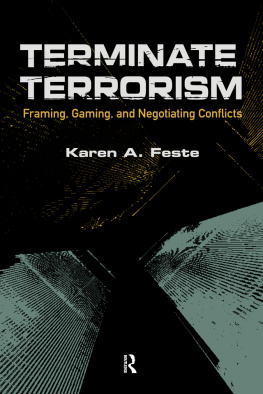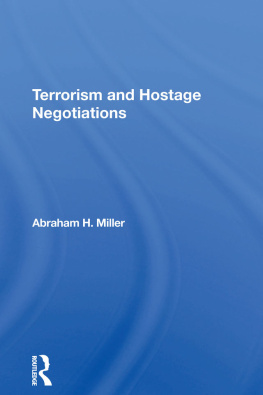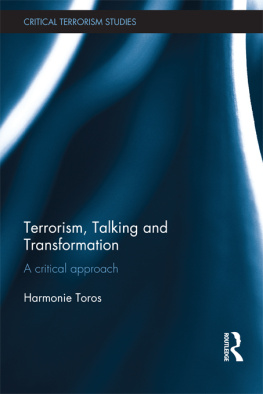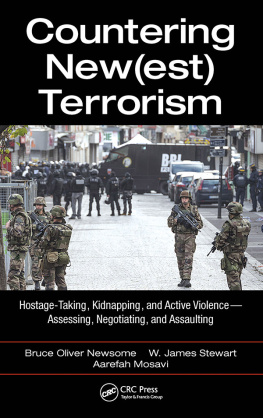Terminate Terrorism
International Studies Intensives
Mark A. Boyer, Series Editor
International Studies Intensives (ISI) is a book series that springs from the desire to keep students engaged in the world around them. Books in the series address a wide array of topics in the international studies field, all devoted to getting students involved in the ways in which international events affect their daily lives. ISI books focus on innovative topics and approaches to study that cover popular and scholarly debates and employ new methods for presenting theories and concepts to students and scholars alike. ISI books pack a lot of information into a small spacethey are meant to offer an intensive introduction to subjects often left out of the curriculum. ISI books are relatively short, visually attractive, and affordably priced.
Editorial Board
Robin Broad, American University
Michael Butler, Clark University
Dan Caldwell, Pepperdine University
Robert Denemark, University of Delaware
A. Cooper Drury, University of Missouri, Columbia
Doug Foyle, Wesleyan University
H. Richard Friman, Marquette University
Jean Garrison, University of Wyoming
Vicki Golich, Metro State College of Denver
Jeffrey Hart, Indiana University
Shareen Hertel, University of Connecticut
Jeanne Hey, Miami University
Steve Hook, Kent State University
Valerie Hudson, Brigham Young University
David Kinsella, Portland State University
Robert Kudrle, University of Minnesota
Lynn Kuzma, University of Southern Maine
Steve Lamy, University of Southern California
Jeffrey Lantis, College of Wooster
James McCormick, Iowa State University
James Mittelman, American University
Lisa Prugl, Florida International University
Paul Sharp, University of Minnesota, Duluth
David Skidmore, Drake University
Jennifer Sterling Folker, University of Connecticut
Emek Ucarer, Bucknell University
Jonathan Wilkenfeld, University of Maryland
Titles in the Series
The Rules of the Game: A Primer on International Relations, Mark R. Amstutz
Development Redefined: How the Market Met Its Match, Robin Broad and John Cavanagh
A Tale of Two Quagmires: Iraq, Vietnam, and the Hard Lessons of War, Kenneth J. Campbell
Celebrity Diplomacy, Andrew F. Cooper
The Global Classroom: An Essential Guide to Study Abroad, Jeffrey S. Lantis and Jessica DuPlaga
Sixteen Million One: Understanding Civil War, Patrick M. Regan
People Count! Networked Individuals in Global Politics, James N. Rosenau
Paradoxes of Power: U.S. Foreign Policy in a Changing World, David Skidmore
Global Democracy and the World Social Forums, Jackie Smith et al.
Forthcoming in the Series
Protecting the Global Environment, Gary C. Bryner
Disease Across Borders: Health and Security in a Globalizing World, Debra L. DeLaet and David E. DeLaet
Spirits Talking: Conversations on Right and Wrong in the Affairs of States, Stephen D. Wrage
Terminate Terrorism
Framing, Gaming, and Negotiating Conflicts
Karen A. Feste
First published 2010 by Paradigm Publishers
Published 2016 by Routledge
2 Park Square, Milton Park, Abingdon, Oxon OX14 4RN
711 Third Avenue, New York, NY 10017, USA
Routledge is an imprint of the Taylor & Francis Group, an informa business
Copyright 2010, Taylor & Francis.
All rights reserved. No part of this book may be reprinted or reproduced or utilised in any form or by any electronic, mechanical, or other means, now known or hereafter invented, including photocopying and recording, or in any information storage or retrieval system, without permission in writing from the publishers.
Notice:
Product or corporate names may be trademarks or registered trademarks, and are used only for identification and explanation without intent to infringe.
Cataloging-in-Publication Data is available at the Library of Congress.
Designed by Straight Creek Bookmakers.
Typeset by Raese Design.
ISBN 13: 978-1-59451-821-8 (hbk)
ISBN 13: 978-1-59451-822-5 (pbk)
To Serge
Contents
Introduction
Terminating Terrorism
The Problem
On September 11, 1990, President George H. W. Bush, father of his namesake-successor George W., delivered a major address to Congress that unveiled ambitious plans for a New World Order. Less than a year earlier, the Cold War had come to an endnot with a bang, but a ripplethrough a series of fast-moving events that transformed the bipolar international system anchored in U.S.USSR ideological confrontation and balance of power conflict, into a unipolar, American-dominated world. The challenge for U.S. leadership at the start of the postCold War period was to grasp how the world had changed and whether American foreign policy should focus on maintaining stability or adopting new visions. Bushs landmark speech, broadcast on national television by all major networks, outlined a future of global peace based on spreading democracy, free trade expansion, and governance through rule of law. Nations would share responsibility for freedom and justicethe strong respecting rights of the weak. It was a speech of victory: a proud moment in the life of America, timed perfectly to reflect new political dynamics. In the fall of 1990, U.S. Secretary of State James Baker had begun to assemble an international coalition of military forces drawn from both sides of the previous East-West divide in the campaign to liberate Kuwait from Iraqi occupation following the August 2 invasion by Saddam Husseins forces; thousands of troops from more than thirty countries would shortly be dispatched to the Middle East, poised to fight a common enemy. Not all states were eager to join; the American promise of economic aid or debt forgiveness persuaded them. Within a few months, more than 500,000 U.S. forces alone would be deployed in the vicinity, mostly in neighboring Saudi Arabia, a solid American ally. In the brief JanuaryFebruary 1991 Persian Gulf War that followed, victory over Iraq came quickly and easily. Allied casualties were light. Moreover, in managing the first major international conflict of the new global era, the world had passed a milestone: the United Nations, freed from Cold War stalemate, could fulfill the vision of its founders, activating its role to punish aggressors and secure global peace. The United States, sole standing superpower, would lead the way.
Was the American president promising a structure of international relations based on a revitalized set of rulesrespect for international law? Or, did the phrase New World Order merely signify a bid for supporting American intervention policy and traditional power politics? Interpretations vary. Ten years after the 1991 Gulf War ended, several thousand American troops still remained in oil-rich Saudi Arabiaa military situation that began to assume the shape of a permanent presence. The occupation policy linked two objectives: U.S. interests to protect and secure energy resources for the West, and Saudi Arabian officials interest in maintaining power and regime stability in its closed political system. Designed to uphold the status quo, the dovetailed plan was not welcomed by everyone. Opposition from Saudi Arabian citizens who lived inside the country and beyond, voiced concerns over a policy that restricted possibilities for government reform and societal independence; longstanding and newly sprouting Islamic-based political groups in neighboring Middle East countries expressed resentment over the continued, commanding American influence in the region. Throughout the 1990s, American military presence in the Middle East and the tight U.S.Saudi Arabian relationship, combined with ongoing, generous foreign aid the United States gave each year to Egypt and Israel (conditioned by the Camp David Accords of the late 1970s to help resolve the chronic Arab-Israeli disputethe two countries were usually the top recipients of U.S. financial assistance distributed worldwide), produced a strong-winded, lethal current of anti-American blowback, unintended policy consequences. Blowback manifested most vividly in a series of terrorist attacks directed against the United States.








